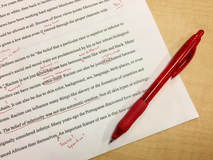
In her case, the main reason that it's so much better is that her plot is better controlled than in her earlier books. It's as though she's had a piece of paper by her side on which she's already mapped out the narrative, like a route marked out on a map. Perhaps she did exactly that.
I thought her first book wasn't very well edited, to be honest. A debut novel is often a bit random, lacking discipline, and the author is often too closely attached to it. As a result, an editor's advice given is often ignored, or taken in hurt. In this case I suspect that the editor of her first book simply was too gentle to spell out in words of one syllable just what needed to be done. He wasn't brutal enough.
You'll notice that I haven't named the author in case she reads this! But the (de facto) editor of that first book was me, and so... well, the book didn't do as well as the author might have hoped. But her novel was essentially a good one and maybe one day, when she's rich and famous, she'll get the chance to re-write it.
In the meantime she dumped me for another editor, someone I think she knew less well and was therefore able to tell like it is.
These days I'm much more experienced as an editor and if something needs to be said, it's better said. A poorly-edited book never sells well. Not that the writers necessarily listen, of course, and it's only natural to hear criticism more loudly than praise. But remember that if an editor says a book should be edited in various ways, it also means it can be edited – it's got real potential. If it can't be edited, it's probably only fit for the bin.
Gordon Lawrie's editing services are available through his own website.








